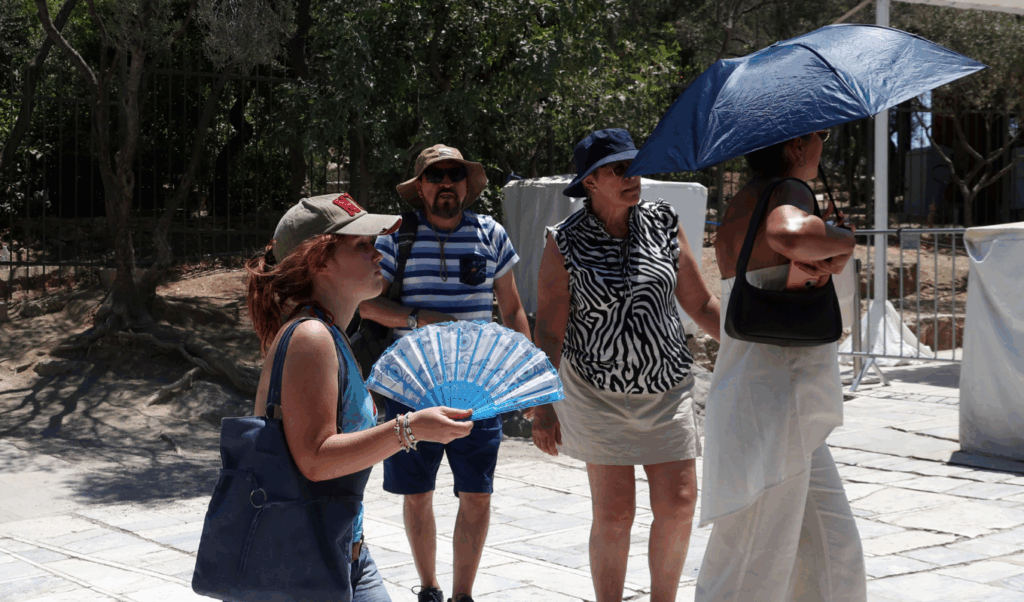The emergency weather deterioration bulletin has been updated by the Hellenic National Meteorological Service (HNMS), warning of temperatures above 40 degrees, while the heatwave is expected to last until Sunday.
Specifically, according to the HNMS emergency heatwave bulletin:
“High temperatures are forecast throughout our country for the entire week starting today, Monday (21-7-2025). Possible end of the heatwave on Sunday (27-7-2025).
The highest values (maximum temperatures above 41 degrees) will be recorded from tomorrow Tuesday (22-7-2025) onwards, in the interior of mainland Greece.
It is noted that:
A. In coastal areas of mainland Greece, the maximum temperature will be 2 to 4 degrees lower than the temperature in the interior of mainland Greece.
B. Minimum temperatures from Wednesday in urban centers will remain at high levels and will range around 27 to 29 degrees Celsius.
For the first four days in detail:
1. On Monday (21-07-25) high temperatures will prevail across all mainland areas, the Ionian islands, Eastern Aegean islands and the Dodecanese. Maximum values will reach:
a) on the mainland 38 to 40 and locally in Thessaly and central Macedonia 41 degrees Celsius. In Athens and Thessaloniki 38 degrees.
b) in the Ionian islands, Eastern Aegean islands and Dodecanese 35 to 36 degrees Celsius.
2. On Tuesday (22-07-25) and Wednesday (23-07-25) temperatures will rise further. Maximum values will reach:
a) in mainland Greece 39 to 41, locally in central Macedonia, eastern Central Greece and eastern Peloponnese 42 and in Thessaly 43 degrees Celsius. In Athens and Thessaloniki 39 to 40 degrees.
b) in the Eastern Aegean islands and Dodecanese 37 to 39 and locally on Wednesday (23-07-25) 40 degrees Celsius.
c) in the Ionian islands 36 to 38 degrees Celsius.
3. On Thursday (24-07-25) temperatures will remain at high levels. It is estimated that maximum values will reach:
a) on the mainland 39 to 41 and locally in eastern areas 42 to 43 degrees Celsius. In Athens 40 to 41 and in Thessaloniki 39 degrees.
b) in the Eastern Aegean islands and Dodecanese 38 to 40 degrees Celsius.
c) in the Ionian islands 37 to 39 degrees Celsius.
The emergency bulletin will be updated every 24 hours, which will also redefine temperatures per day and forecast the end of the heatwave.
Heatwave: Emergency measures for worker protection
From today, emergency protection measures for private sector workers against thermal stress due to extremely high temperatures are in effect. In areas where extreme heatwave conditions and intense discomfort are forecast, suspension of outdoor work from 12:00 to 17:00 becomes mandatory.
At the same time, businesses are encouraged -where feasible- to provide remote work opportunities for employees belonging to high-risk groups.
The Ministry of Labor and Social Security announced detailed measures being implemented on Monday, July 21, 2025, to address the consequences of the heatwave in workplaces.
A. Measures to address thermal stress for private sector workers
To address thermal stress for employees in dependent employment relationships in the private sector, employers must take technical and organizational protection measures, according to the indicative and non-restrictive list of circular No. 34666/03.06.2024 titled “Prevention of thermal stress for workers” (ADA: RG1N46NLDG-WO6).
B. Mandatory work suspension for outdoor activities
For workers in businesses located in areas where, according to the latest forecasting data from the National Meteorological Service (HNMS), extremely high temperatures and discomfort levels (WBGT) are expected, specifically in the plains of the Regional Units of Evros (Soufli area), Serres (Serres area), Larissa (Larissa area), Boeotia (Aliartou area), Chalkidiki (Polygyros area), Imathia (Veria area), in the Regional Units of Trikala, Fthiotida, Aetoloacarnania, as well as in the Ionian islands, eastern Rhodes and coastal areas of the Regional Units of Corinthia, Argolida, Arcadia, Laconia and Messinia, work suspension becomes mandatory on Monday 21.07.2025, during the period 12:00-17:00, for manual work performed outdoors, such as work on technical and construction projects, construction sites, shipbuilding and repair zones, distribution and transportation of products and objects by two-wheeled vehicles, scooters, roller skates (delivery), etc.
It is noted that the above cases of mandatory work suspension include all workers regardless of their type of employment, including digital platforms under Article 68 of Law 4808/2021.
In case the delivery work suspension measure is applied to delivery businesses, this concerns all businesses conducting delivery, whether they maintain a physical store or digital platform. However, the option of order pickup with direct collection by the user from the store/pickup point (takeaway) may remain active, as well as the possible ability to execute orders with private and public use vehicles excluding all forms of two-wheelers and mopeds, as defined in the Road Traffic Code provisions, provided they have air conditioning.
Work suspension does not apply to economic activities concerning significant and socially critical infrastructure in the sectors of health, transport and public utilities (e.g., health units, water supply, electricity, air transport, handling, maritime, land and rail transport), provided other technical and organizational measures from circular No. 34666/03.06.2024 “Prevention of thermal stress for workers” (ADA: RG1N46NLDG-WO6) are taken, including work time organization. In case of non-compliance with the obligations of this directive, the Labor Inspectorate imposes, according to Articles 23 and 24 of Law 3996/2011 (A’ 170), a monetary fine of two thousand (2,000) euros per employee of the enterprise.
C. Provision of remote work through teleworking
For employees in dependent employment relationships in the private sector who belong to high-risk groups (Appendix 2 table of circular No. 34666/03.06.2024) and especially in cases of exposure to aggravating conditions in the areas of paragraph B of this circular, businesses should ensure that they are given the opportunity to work remotely if feasible based on the nature of their work.
D. Emergency measures for work time organization
To address thermal stress for workers in the areas of paragraph B of this circular and to facilitate workers during possible changes in their arrival and departure times from work, employers may not register in advance in the ERGANI I.S. every change in work time organization.
What is thermal stress
The country enters conditions of extreme thermal burden from today, which can lead to serious health problems for all population groups and especially vulnerable groups.
The country will be in the red zone, according to the HEAT ALARM biometeorology warning system of the National Observatory of Athens.
Christos Giannaros, biometeorology expert at the National Observatory of Athens, stated to ERTNews: “This contributes to the thermal burden of the human body, meaning the human organism struggles to expel heat and this leads to stress on basic functions from mild symptoms to extreme consequences and heatstroke“.
Thermal stress or heat stress is the human body’s reaction to external temperature.
The most important symptoms are headache, tendency to faint, excessive sweating, nausea, vomiting, rapid and weak pulse.
Particularly careful should be elderly people, babies and small children, pregnant and breastfeeding women, people working in hot environments, as well as people with chronic conditions.
Panagiotis Chalvatsiotis, associate professor of pathology at the University of Athens, spoke to ERTNews, noting that “hydration is a very important element to address the problem, our food should be rich in vegetables and fruits because these contain a lot of water, no fatty foods, we should avoid coffee because it causes diuresis and alcohol. We wear hats, sunscreen, and should not be exposed to the sun”.




